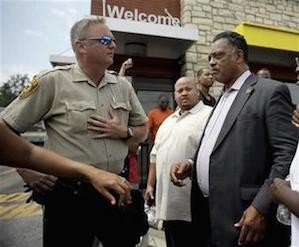
In a public statement, the city said the mayor, the City Council and employees have been exploring ways to increase the number of African-American applicants to the law enforcement academy, develop incentive programs to encourage city residency for police officers and raise money for cameras that would be attached to patrol car dashboards and officers' vests.
"We plan to learn from this tragedy, as we further provide for the safety of our residents and businesses and progress our community through reconciliation and healing," the statement said.
After sundown Tuesday, the streets of Fergusonfilled once more with protesters who marched along the street in a large square-shaped pattern. There were no immediate reports of clashes with police, who stood by with batons and gas masks.
Benjamin Crump, an attorney for Brown's family, said the 18-year-old's funeral and memorial service would be Monday. The time and location had not been finalized.
Earlier Tuesday, a large crowd gathered in nearby St. Louis after officers responding to a report of a store robbery shot and killed a knife-wielding man. Police Chief Sam Dotson said the suspect acted erratically and told responding officers to "kill me now."
Some members of the crowd shouted "Hands up, don't shoot," a phrase that has been a refrain of protests since Brown's death on Aug. 9. Like Brown, the 23-year-old suspect killed Tuesday was black.
A grand jury could begin hearing evidence Wednesday to determine whether the officer, Darren Wilson, should be charged in Brown's death, said Ed Magee, spokesman for St. Louis County's prosecuting attorney.
Wilson was recognized during a Ferguson City Council meeting in February, getting special recognition for what Police Chief Thomas Jackson said then was his role in responding to a report of a suspicious vehicle, then struggling with the driver and detaining him until help arrived. Jackson said the suspect was preparing a large quantity of marijuana for sale.
Attorney General Eric Holder was scheduled to travel to Ferguson on Wednesday to meet with FBI and other officials carrying out an independent federal investigation into Brown's death.
The Justice Department has mounted an unusually swift and aggressive response to Brown's death, from the independent autopsy to dozens of FBI agents combing Ferguson for witnesses to the shooting.
The Justice Department arranged for a third autopsy to be performed by one of the military's most experienced medical examiners, Holder said.
Missouri Gov. Jay Nixon said Tuesday that he would not take any action to remove St. Louis County Prosecutor Bob McCulloch from the investigation into Brown's death.
McCulloch's deep family connections to police have been cited by some black leaders who question his ability to be impartial. McCullouch's father, mother, brother, uncle and cousin all worked for St. Louis' police department, and his father was killed while responding to a call involving a black suspect.
Nixon cited the "well-established process" by which prosecutors can recuse themselves from pending investigations.
Departing from that process, Nixon said in a statement, "could unnecessarily inject legal uncertainty into this matter and potentially jeopardize the prosecution."
On Monday night, the National Guard arrived inFerguson but kept its distance from the streets during another night of unrest.
Capt. Ron Johnson of the Missouri Highway Patrol, who is in charge of security in Ferguson, said bottles and Molotov cocktails were thrown from the crowd and that some officers had come under heavy gunfire. Police originally said 31 were arrested, but St. Louis County spokeswoman Candace Jarrett on Tuesday said 57 people were booked at the county jail alone, and perhaps more at other jails in the region.
A list of those arrested showed that only four live inFerguson, though many live in St. Louis and other surrounding communities. Sixteen are from out of state.
___
Associated Press writers Alan Scher Zagier inFerguson, Jim Salter in St. Louis and David A. Lieb in Jefferson City contributed to this report.